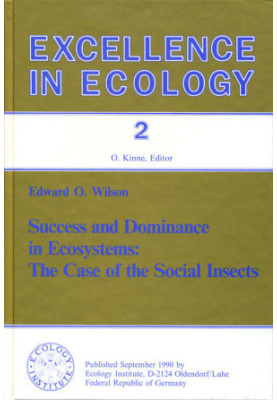Success and Dominance in Ecosystems: The Case of the Social Insects
 Моментальное скачивание
Моментальное скачивание
после оплаты (24/7)
 Широкий выбор форматов
Широкий выбор форматов
(для всех устройств)
 Полная версия книги
Полная версия книги
(в т.ч. для Apple и Android)
Book 2 of the Excellence in Ecology series is authored by Professor Edward Osborne Wilson (Museum of Comparative Zoology, Harvard University, Cambridge, MA 02138, USA), the recipient of the ECI Prize 1987 in terrestrial ecology. Ed Wilson has demonstrated excellence in numerous publications centering on the fields of population biology, biogeography, sociobiology, biodiversity, and evolutionary biology. His outstanding achievements and his unique career as research ecologist are highlighted in a laudatio (p. XVII) by Professor Sir Richard Southwood, who chaired the 1987 ECI Jury. The achievements which won Ed Wilson the ECI Prize, as formulated by the jury, have been printed in a document which is reproduced on p. XIV.Ed Wilson's book addresses success and dominance in ecosystemswith professional mastery - matured over decades of devoted, criticalresearch. Defining 'success' as evolutionary longevity of a clade (aspecies and its descendents), and 'dominance' as abundance of a cladecontrolling the appropriation of biomass and energy and thus affectingcoexisting organisms, Wilson exemplifies his subject by referringto eusocial insects, especially termites and ants but also bees andwasps. Eusocial insects are characterized by care of young, overlap ofadult generations and division of labor among reproductive and nonreproductivecastes. They have achieved an overwhelming dominanceand exert a great impact on many other organisms. Their dominanceresults from competitive superiority based on a sophisticated socialorganization. Eusocial insects cover a large trophophoric area withnear-continuous exploration and defense. Functionally, their coloniesare so tightly integrated as to act as superorganisms. Success anddominance of colonial life derive from parallel operations of multipleworkers maximizing achievements in the completion of tasks; aggressive,even suicidal behavior; superior protection and exploitation ofresources; and enhanced control of a population's microenvironment.Why then have social insects not entirely outcompeted their solitarycounterparts? The essence of Wilson's answer to this question:while social insects prevail in terms of biomass in most terrestrialhabitats, solitary insects appear to 'fill the cracks' left by social insects,and they breed faster on smaller amounts of resources.Hawaii was not colonized by social insects before the establishmentof human societies. This remote archipelago thus provides achance to study the evolution of the endemic fauna and flora in theabsence of social insects. Wilson considers that freedom from socialinsects - especially ants and termites - may have contributed significantlyto some of the characterizing traits of the Hawaiian biota, suchas flightlessness, lack of evasive behavior, increased abundance anddiversity of beetles and spiders, adaptive predation in some insectgroups, and loss of extrafloral nectaries in flowering plants.Ed Wilson's small book is packed with facts, ideas and visions. Itfloats on a sea of admiration and love for nature. I am sure the bookwill stimulate further research, as well as interchange among terrestrial,marine and limnetic ecologists, and it will carry the word of aleading scholar devoted to analyzing, comprehending and protectingnature far beyond professional borderlines.[Otto Kinne, Director ECI, from Introduction]
LF/183585/R
Характеристики
- ФИО Автора
- Edward O. Wilson
- Язык
- Английский
- Серия
- Excellence in Ecology 2
- Дата выхода
- 1990

























